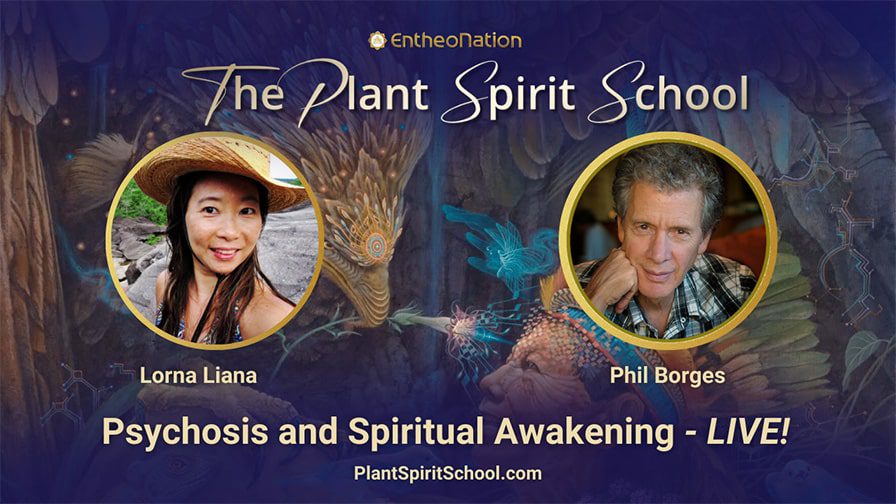Psychosis & Spiritual Awakening in the Psychedelic Renaissance with Phil Borges

Is there a relationship between what we call “psychosis” and shamanic states of consciousness? World-renowned author, photographer, and filmmaker Phil Borges joins us to discuss this fascinating intersection.
Having lived with tribal communities of all continents, Phil Borges has endeavored to document their lives beyond the romantic, sometimes exoticized images they typically hold in the Global North. Particularly, Phil felt called to portray their struggles, the largest ones usually resulting from oppressive and extractive actions of either those governing their lands or outside forces invading them.
In this interview, Phil shares with Lorna some compelling stories of extra-ordinary individuals he’s met on his journeys – healers, shamans, and holy people who go into trance states or hold ceremonies which would, by all rights, be considered abnormal if viewed through the prism of what we commonly define as ‘sanity’ in the West.
Learn more about ancestral ayahuasca ceremonies involving trance states: What’s a “Traditional” Ayahuasca Ceremony? Hint: It’s Not What You Think
Among Turkic and other Central Asian peoples, for example, what we define today as mental illness was commonly attributed to the influences of evil spirits, which could be expelled in the course of the shaman’s or mullah’s healing. With their profound involvement in the spirit world, some healers would undergo a ‘shamanic illness’: a condition traditionally identified as the call of spirits, but later branded by more modern societies as symptomatic of a mental disorder.
However, traditional shamanic cultures often consider the symptoms we in the Western world label ‘psychosis’ as an individual’s special sensitivity that can be used for healing or visionary purposes if understood and supported correctly. These symptoms anthropologists have referred to as the ‘shamanic illness’ are believed by traditional cultures to be a ‘calling’ the individual is receiving to begin an initiation (intensive training) to do shamanic work.
Crisis as the Gateway to Awareness
In Phil’s latest film, CRAZYWISE, one of the main subjects is a young man who, after years of heavy therapy with psychiatric medication and suffering from horrible side effects, decided to put an end to all that pharmacological intoxication and try to heal through meditation.
A crisis is revealed as Phil follows the story of mental healthcare in the US, which relies heavily on long-term medicalization of patients and doesn’t have a clear idea of how to actually heal serious psychological disorders. Phil argues that prolonged intake of psychiatric medication is not just harmful to the body, but that it often cuts off the process of spiritual opening sparked by a psychotic break from reality, which, if handled correctly, could take the person to a higher level of awareness and functioning.
Some plant medicines, such as the ayahuasca vine, are proving to be effective for many in seeking to treat certain psychological disorders like depression in a more natural and less harmful way. Read more: Microdosing Ayahuasca to Treat Depression
Phil also discusses the experiences of some who have suffered a psychological crisis, who often describe their initial symptoms using similar vocabulary to many who try summarizing a psychedelic experience. He believes that crisis could be the gateway to ego dissolution, but far too often leads to ego inflammation due to the common modern-day societal reactions to those in crisis sharing their vulnerability and perceptions of life with others.
Psychedelic-Assisted Psychotherapy – The New Form of Shamanism
Finally, with all the advances we have made in research of the effects of psychedelics and plant medicines, Phil is confident that, if used responsibly, these tools can safely and effectively treat some psychological disorders. However, the complex question emerges of who will administer these treatments, i.e. assume the role which in indigenous societies is occupied by the shaman, mystic, or healer.
In many cultures which maintain ancestral traditions, aspiring healers are commonly supported and trained by their elders. In the West, however, the situation gets more complicated with almost anyone with the inclination to do so being able to declare themselves a shaman.
MUST READS: So You Want to Be An Ayahuasca Shaman? and The Challenges of Becoming a Woman Pajé
Putting in enough determination and self-promotional efforts, self-anointed facilitators can become notable figures in the emerging psychedelic community. With the lack of regulation in the space, however, some of them may prove to be less than capable, or even dangerous, for the often extremely vulnerable clientele they serve. Reflecting on that, Phil and Lorna discuss the future of being able to choose one’s psychedelic-assisted psychotherapist and the criteria that must be established and met for them to safely and effectively facilitate healing.
Watch the interview to learn more:
For a huge range of talks with experts like Phil, sign up to the Plant Spirit School now!
In this interview, you will hear about:
[+] The fascinating relationship between psychological crisis and the concept of spiritual awakening;
[+] How fear can be a damning factor for those embarking into ego dissolution, pushing them toward psychosis;
[+] How the current revival of psychedelic research and the emergence of psychedelic psychotherapy may bring healing where pharmaceuticals have been failing and help reshape the global mental health landscape.
About Phil Borges
For nearly three decades, Phil Borges has been documenting indigenous and tribal societies, striving to create an understanding of their cultures and the challenges they face.
His work is exhibited in museums and galleries worldwide, and his latest documentary film CRAZYWISE explores the deeper complexities and effective approaches to the concept of psychological crisis.
Phil has hosted television documentaries on indigenous cultures and shamanism for Discovery and National Geographic channels, and his TED talks have received over 6 million views.
